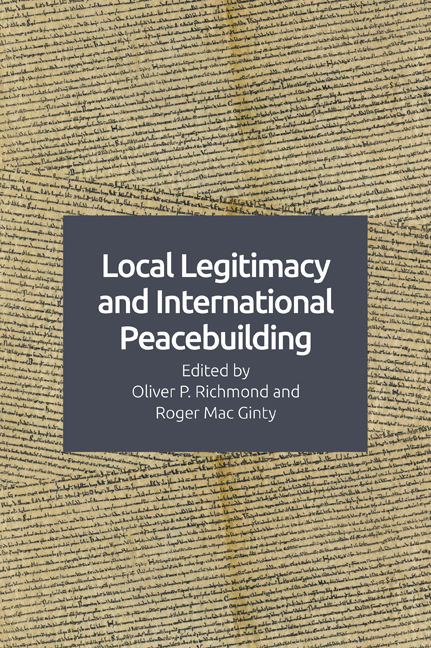Book contents
- Frontmatter
- Contents
- Contributors
- Foreword: The Riddle of Legitimacy
- Introduction: Legitimacy and Peace in the Age of Intervention
- One The Hybridization of Legitimacy in Processes of Peace Formation: the Bougainville Case
- Two International Intervention and Relational Legitimacy
- Three From a Divisive Peace Agreement to a Legitimate Peace in Colombia
- Four Banners, Billy Clubs and Boomerangs: Leveraging and Counter-Leveraging Legitimacy in the Occupied Palestinian Territory
- Five Peacebuilding as a Self-Legitimising System: The Case of Bosnia-Herzegovina
- Six ‘We Are There at Their Invitation’: Struggles for Legitimacy during the US Coalition Invasion–Occupation of Iraq
- Seven Inclusion and Performance as Sources of Legitimacy – the UN Mediation on Syria
- Eight Agonisation to Re-Legitimise the Postcolonial, Post-Conflict Somaliland
- Nine Third Party Legitimacy and International Mediation: Peacemaking through Pan-Africanism in Sudan
- Ten Post-War Legitimacy: A Framework on Relational Agency in Peacebuilding
- Eleven Legitimacy in Lebanon
- Conclusion: Peacebuilding and Legitimacy: Some Concluding Thoughts
- Index
Foreword: The Riddle of Legitimacy
Published online by Cambridge University Press: 17 November 2020
- Frontmatter
- Contents
- Contributors
- Foreword: The Riddle of Legitimacy
- Introduction: Legitimacy and Peace in the Age of Intervention
- One The Hybridization of Legitimacy in Processes of Peace Formation: the Bougainville Case
- Two International Intervention and Relational Legitimacy
- Three From a Divisive Peace Agreement to a Legitimate Peace in Colombia
- Four Banners, Billy Clubs and Boomerangs: Leveraging and Counter-Leveraging Legitimacy in the Occupied Palestinian Territory
- Five Peacebuilding as a Self-Legitimising System: The Case of Bosnia-Herzegovina
- Six ‘We Are There at Their Invitation’: Struggles for Legitimacy during the US Coalition Invasion–Occupation of Iraq
- Seven Inclusion and Performance as Sources of Legitimacy – the UN Mediation on Syria
- Eight Agonisation to Re-Legitimise the Postcolonial, Post-Conflict Somaliland
- Nine Third Party Legitimacy and International Mediation: Peacemaking through Pan-Africanism in Sudan
- Ten Post-War Legitimacy: A Framework on Relational Agency in Peacebuilding
- Eleven Legitimacy in Lebanon
- Conclusion: Peacebuilding and Legitimacy: Some Concluding Thoughts
- Index
Summary
The Riddle of Legitimacy
I landed my first job with the UN in 2000, working for the UN Mission in Kosovo at a time when UN peacekeeping was still at its peak with 18 field missions spread over four continents. Back then, UN peacekeeping was embarking on some of its most ambitious tasks and my experience in Kosovo was very much at the heart of it: rebuilding functioning institutions for a multi-ethnic society that would share and benefit from those institutions.
While grasping the complexity of the Kosovar conflict and appreciating the thin line that divides just from right and right from wrong, I came to understand that the international legitimacy of the Mission, derived from the firm political will of the international community expressed through the Security Council, was not the only source of justification for our presence. Rather, further legitimacy could be found in the smiles of ordinary people – and most of all the children – raising their fingers in a sign of victory whenever a UN vehicle passed by. It had to be proof that I was on the right side of history!
However, as I spent my time working with the ostracized and isolated Kosovo-Serb communities, that picture became murkier and much harder to comprehend. The legitimate aspirations of the two communities did not add up to the same vision of peace and security. As the mission strived to build a multi-ethnic society in Kosovo, working to develop inclusive institutions and mechanisms, those same ordinary people – and most of all those once-smiling children – started giving dirty looks to passing UN vehicles. Our blue flag no longer made us righteous in the eyes of one community, while the other had always been resentful or mistrustful of the peace we were meant to build. The international legitimacy of the intervention seemed quickly at odds with the notion of state legitimacy (for example, the government in Belgrade versus the authorities in Pristina) and even more so at the community level, with different aspirations, concerns and priorities even within the same ethnical groups.
My first brush with the riddle of legitimacy quickly showed that there was not one single source of legitimacy that could be relied upon to generate consensus among people.
- Type
- Chapter
- Information
- Local Legitimacy and International Peace Intervention , pp. xii - xviPublisher: Edinburgh University PressPrint publication year: 2020

